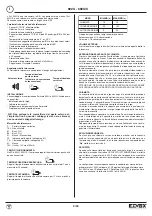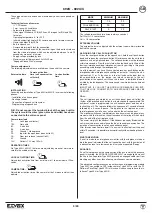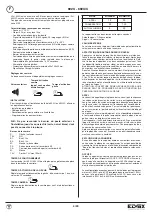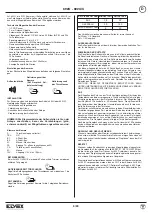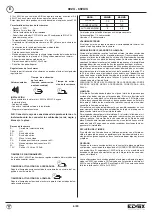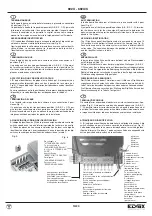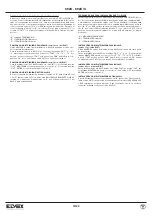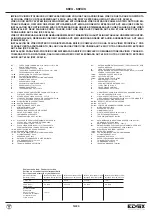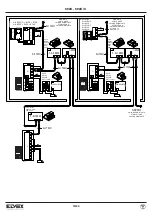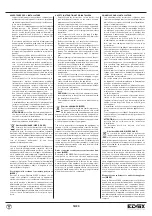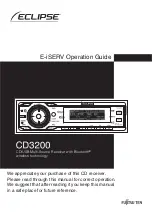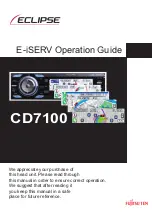
692U - 692U/C
12/20
Legenda per schemi di collegamento - Legenda for wiring diagram - Légende pour schémas de raccordement
Beschriftung für Schalpläne - Leyenda para esquemas de conexionado - Legenda para esquemas de conexionado
TERMINAZIONE BUS PER IMPIANTI DUE FILI ELVOX
Questa nota si applica a tutti i dispositivi della tecnologia DUE FILI ELVOX dotati
del “connettore di terminazione BUS” identificato dalla scritta serigrafica “ABC” e
segnalato sugli schemi di collegamento con *. Per il corretto adattamento della
linea va inserito un ponticello secondo la seguente regola:
Mantenere il ponticello in posizione “A” se il BUS entra ed esce dal dispositivo;
Spostare il ponticello in posizione “B” (se cavo Elvox) oppure in posizione “C” (se
cavo “CAT5” con i doppini accoppiati) se la linea del BUS “termina” nel dispositivo
stesso.
“A” = NESSUNA TERMINAZIONE
“B” = TERMINAZIONE 100 ohm
“C” = TERMINAZIONE 50 ohm
IMPIANTI CON DISTRIBUTORE PASSIVO 692D
(versione “barra din”)
Utlizzare SEMPRE l’uscita 1 del distributore art.692D (l’unica che non ha il ponti-
cello di terminazione).
Per la terminazione dell’art.692D:
Se le uscite “OUT”, “2”, “3” o “4” non vengono utilizzate, MANTENERE il ponticello
sul connettore “TOUT”, “T2”, “T3” o “T4” . Il ponticello “TOUT” di default è in po-
sizione “100” (cavo Elvox), posizionarlo su “50” solo se si utilizza un cavo CAT5 con
i doppini accoppiati.
IMPIANTI CON DISTRIBUTORE PASSIVO 692D
(versione non “barra din”)
Per la terminazione dell’art.692D (versione non “barra din”):
Se l’uscita “OUT” non viene utilizzata, MANTENERE il ponticello sul connettore
“A”.
Se l’uscita “OUT” viene utilizzata, TOGLIERE il ponticello dal connettore “A”.
IMPIANTI CON DISTRIBUTORE ATTIVO 692D/2.
Il ponticello di terminazione va posizionato su “B” (per cavo Elvox) o su “C” (per
cavo CAT5 con doppini accoppiati) SE E SOLO SE il BUS termina sul dispositivo
stesso. Va lasciato su “A” se si effettua l’entra-esci utilizzando i morsetti 1-2 del
692D/2.
BUS TERMINATION FOR ELVOX TWO-WIRE INSTALLATIONS
This note applies to all devices with ELVOX TWO-WIRE technology equipped with
“BUS termination connector”, which is identified by the screen-printed letters
“ABC” and marked on the wiring diagrams with *. For correct adaptation of the
line, a jumper must be inserted according to the following rule: Keep the jumper in
position “A” if the BUS enters and exists from the device; Move the jumper to po-
sition “B” (if Elvox cable) or to position “C” (if CAT5 twisted pair cable) if the BUS
line terminates in the device itself.
“A” = NO TERMINATION
“B” = TERMINATION 100 ohm
“C” = TERMINATION 50 ohm
INSTALLATIONS WITH PASSIVE DISTRIBUTOR 692D
(DIN rail version)
ALWAYS use output 1 on distributor type 692D (the only one that has no termina-
tion jumper).
For termination of type 692D: If outputs “OUT”, “2”, “3” or “4” are not used, KEEP
the jumper on the “TOUT”, “T2”, “T3” or “T4” connector. The default “TOUT” con-
nector is in the “100” position (Elvox cable), position it to “50” only if using a CAT5
twisted pair cable.
INSTALLATIONS WITH PASSIVE DISTRIBUTOR 692D
(non-DIN rail version)
For termination of type 692D (non-DIN rail version): If the “OUT” output is not used,
KEEP the jumper on connector “A”. If the “OUT” output is used, REMOVE the
jumper from connector “A”.
INSTALLATIONS WITH ACTIVE DISTRIBUTOR 692D/2.
The termination jumper must be positioned on “B” (for Elvox cable) or on “C” (for
CAT5 twisted pair cable) IF AND ONLY IF the BUS terminates at the device itself.
It must be left on “A” if effecting entry-exit using terminals 1-2 on 692D/2.
TERMINAISON BUS POUR SYSTÈMES DEUX FILS ELVOX
Cette remarque s’applique à tous les dispositifs de la technologie DEUX FILS
ELVOX équipés du “connecteur de terminaison BUS”, identifié par l’inscription sé-
rigraphiée “ABC” et signalé sur les schémas de raccordement par une *. Pour
l’adaptation correcte de la ligne, insérer un pontet selon la règle ci-après : main-
tenir le pontet en position “A” si le BUS entre et sort du dispositif ; déplacer le
pontet en position “B” (si câble Elvox) ou bien en position “C” (si câble “CAT5”
avec paires torsadées) si la ligne du BUS se termine dans ledit dispositif.
“A” = AUCUNE TERMINAISON
“B” = TERMINAISON 100 ohm
“C” = TERMINAISON 50 ohm
INSTALLATIONS AVEC DISTRIBUTEUR PASSIF 692D
(version “rail DIN”)
Utiliser TOUJOURS la sortie 1 du distributeur art. 692D (la seule qui n’a pas le
pontet de terminaison).
Pour la terminaison de l’art. 692D : si toutes les sorties “OUT”, “2”, “3” ou “4” ne
sont pas utilisées, MAINTENIR le pontet sur le connecteur “TOUT”, “T2”, “T3” ou
“T4”. Le pontet “TOUT” par défaut est en position “100” (câble Elvox), le posi-
tionner sur “50” uniquement si l’on utilise un câble CAT5 à paires torsadées.
INSTALLATIONS AVEC DISTRIBUTEUR PASSIF 692D
(version non “rail DIN”)
Pour la terminaison de l’art. 682D (version non “rail DIN”) : si la sortie “OUT” n’est
pas utilisée, MAINTENIR le pontet sur le connecteur “A”. Si la sortie “OUT” est
utilisée, RETIRER le pontet du connecteur “A”.
INSTALLATIONS AVEC DISTRIBUTEUR ACTIF 692D/2.
Le pontet de terminaison doit être positionné sur “B” (pour câble Elvox) ou sur “C”
(pour câble CAT5 avec paires torsadées) UNIQUEMENT SI le BUS se termine sur
ledit dispositif. Il doit être laissé sur “A” si l’on effectue l’entrée-sortie en utilisant
les bornes 1-2 de l’art. 692D/2.
BUSTERMINIERUNG FÜR ELVOX DUE FILI ANLAGEN
Dieser Hinweis gilt für alle Geräte der Technologie DUE FILI ELVOX die mit dem
Steckverbinder für die Busterminierung, der mit dem Aufdruck “ABC” markiert und
der auf den Anschlussplänen mit * gekennzeichnet ist. Für die korrekte Anpassung
der Leitung ist gemäß folgender Regel eine Steckbrücke einzusetzen: Die Steck-
brücke in Position “A” lassen, wenn der BUS vom Geräte ein- und wieder austritt.
Die Steckbrücke in Position “B” (Elvox-Kabel) bzw. in Position “C” (Cat-5-Kabel)
einsetzen, wenn die Busleitung im Gerät selbst endet.
“A” = KEINE TERMINIERUNG
“B” = TERMINIERUNG 100 Ohm
“C” = TERMINIERUNG 50 Ohm
ANLAGEN MIT PASSIVVERTEILER ART.692D (Version für “DIN-Schiene”)
IMMER den Ausgang 1 des Verteilers Art.692D verwenden (der einzige ohne Ter-
minierungs-Steckbrücke). Für die Terminierung von Art.692D: Wenn die Ausgänge
“OUT”, “2”, “3” oder “4” nicht benutzt werden, die Steckbrücke am Steckverbin-
der “TOUT”, “T2”, “T3” bzw. “T4” EINGESETZT LASSEN. Die Standardposition
der Steckbrücke “TOUT” ist “100” (Elvox-Kabel), nur bei Verwendung eines Cat-
5-Kabels auf “50” setzen.
ANLAGEN MIT PASSIVVERTEILER ART. 692D (Version nicht für “DIN-
Schiene”)
Für die Terminierung von Art.692D (Version nicht für “DIN-Schiene”): Wenn der
Ausgang “OUT” nicht benutzt wird, die Steckbrücke am Steckverbinder “A” EIN-
GESETZT LASSEN. Wenn der Ausgang “OUT” benutzt wird, die Steckbrücke vom
Steckverbinder “A” ENTFERNEN.
ANLAGEN MIT AKTIVVERTEILER ART. 692D/2.
NUR WENN DER BUS im Gerät selbst endet, muss die Terminierungs-Steckbrücke
in Position “B” (Elvox-Kabel) bzw. in “C” (Cat-5-Kabel) eingesetzt werden. Bei Ein-
/Austritt an den Klemmen 1-2 des Art. 692D/2 muss sie in Position “A” gelassen
werden.
Summary of Contents for 692U
Page 16: ...692U 692U C 16 20 NOTE...
Page 17: ...692U 692U C 17 20 NOTE...


